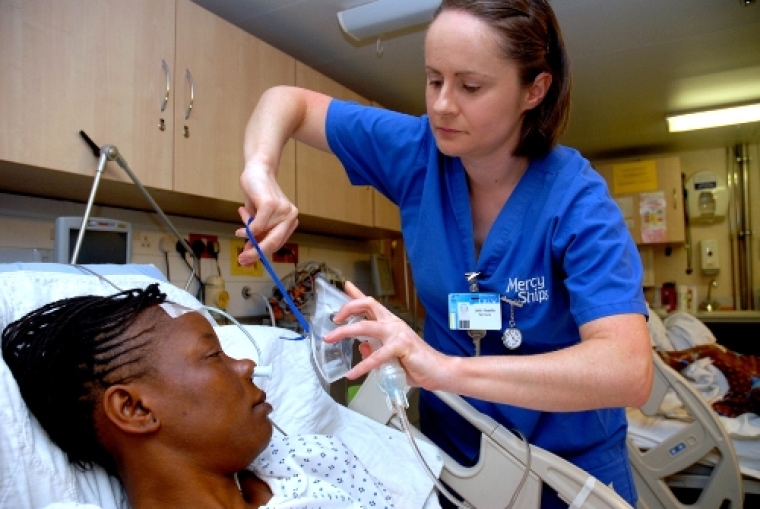
Brisbane nurse Jacki Huestis was told of those words recently when she was visiting her dentist. The comment had been made by the dentist's uncle, a missionary in Africa.
Jacki is back from her fourth period of service as a volunteer with Mercy Ships onboard the world's largest private hospital ship in the poorest nations of West Africa…most recently the nation of Togo.
"I received an email about a critical shortage of nurses during the recent field assignment by volunteer crew on the Africa Mercy. It was stated that life changing surgeries would have to be cancelled if enough nurses could not be found. The idea that such a thing could happen made me so sad. I had not planned to serve again until 2013, but it was impossible to ignore the call," she says.
"Last year in Sierra Leone, one of my first jobs involved assisting with the screening of potential patients and making surgery appointments for them. Having witnessed first hand the emotions of someone accepted for surgery, as opposed to an earlier screening experience when some people were turned away because their condition was something Mercy Ships was unable to help with, it was inconceivable for me to imagine such hopes being destroyed. It was impossible not to go."
Jacki first heard about Mercy Ships in a Queensland Nursing Union magazine in 2005, and went to West Africa for three months during the following year. She served again for three months at a time in 2009, 2011 and this year. "It was again a matter of obtaining leave from work and putting other aspects of life at home on hold. I work in Brisbane in an ENT, Head and Neck, Plastic and Reconstructive Unit of a large tertiary referral hospital. My time in Togo on the hospital ship with its six operating theatres and 78 hospital beds was in the role of charge nurse in the maxillofacial ward."
She describes the work being done by Mercy Ships as indescribably important. "There are so many problems for people living in the world's poorest nations. As a nurse, the lack of health care is astounding. Imagine that if you have a benign tumour it grows so large over time that you cannot breathe and are strangled slowly, or you cannot eat because of the tumour and slowly starve to death. We are so fortunate in Australia with our public health system. It just makes me so sad how people don't appreciate what we have."
"The United Nations Human Development Index, which rates living standards of 187 countries, puts Australia at Number 2. That means that the UN considers that only one other country in the world, Norway, has better living standards than we have. And yet there are many here who still aren't happy."
"Looking back over my time in Togo it is hard to pick a particular highlight of my most recent experience with Mercy Ships. When I think about it, faces and more faces come to mind of the many patients whose lives have been transformed and that I got to be a witness to and participate in that change. It is truly a privilege to have served," Jacki concludes.
Mercy Ships is a global charity that has operated hospital ships in developing nations since 1978 providing free health care and community development services to the forgotten poor. Following the example of Jesus, Mercy Ships brings hope and healing to the poor. Working in partnership with local people, Mercy Ships empowers communities to help themselves. The result is a way out of poverty.
The emphasis is on the needs of the world's poorest nations in West Africa, where the Africa Mercy provides the platform for services extending up to ten months at a time. Mercy Ships works on land-based projects in Sierra Leone in partnership with other organisations, while teams also work in several nations of Central America and the Caribbean. Mercy Ships Australia, one of 15 international support offices is based on the Queensland Sunshine Coast.
For more inforation, visit www.mercyships.org.au
